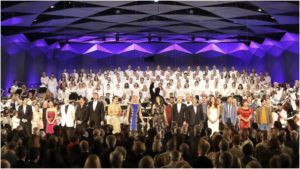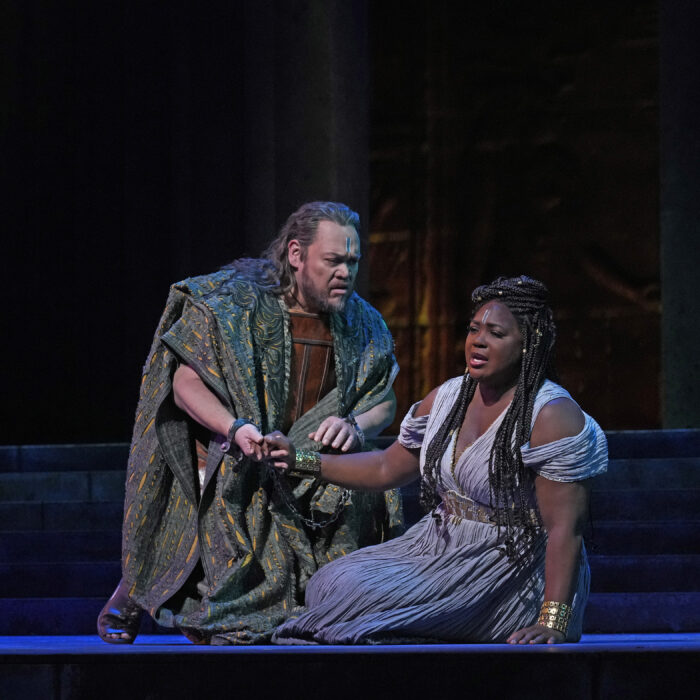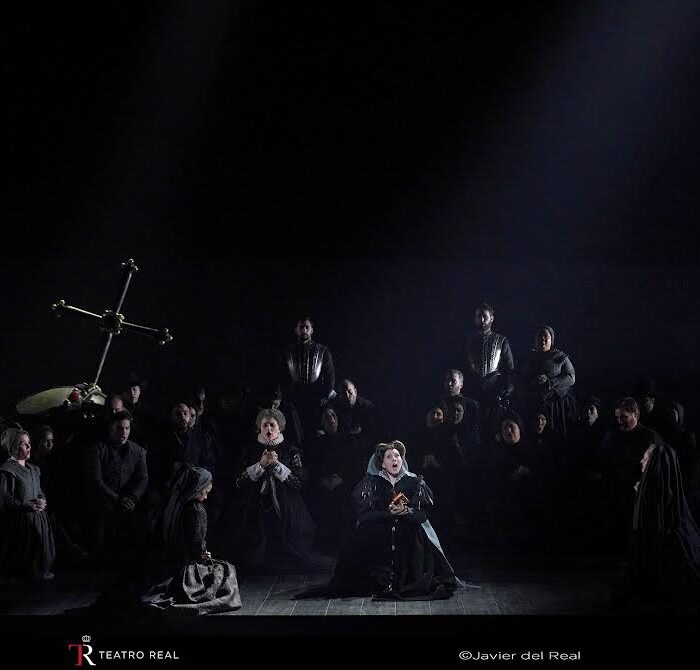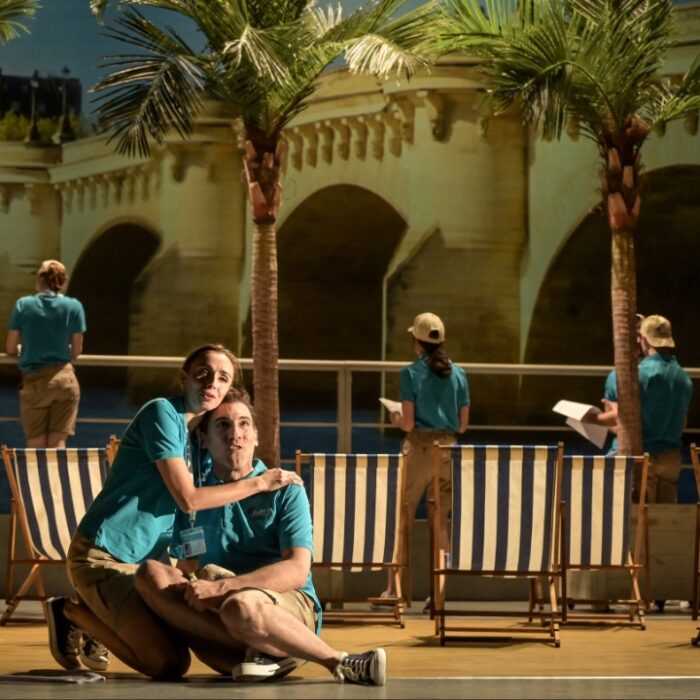
Tanglewood 2018 Review: The Bernstein Centennial Celebration
Despite Uneven Programming, Leonard Bernstein Gets Worthy Celebration
By Matt CostelloThis review is for the gala performance on August 25, 2018.
The date of Leonard Bernstein’s 100thbirthday, and in all my years of making yearly pilgrimages to Tanglewood, I have never seens the grounds, the Koussevitzky Music Shed, the parking lots so full. If the great lawn can be standing room only, it was that night. challenging.
The celebration was unofficially in two parts, with a Friday night concert dedicated to Mahler’s third symphony, one of Bernstein’s major interpretational feats.
Mahler’s Third
I came late to an appreciation of the third symphonyrd. To me, the very opening of the piece after the rapturous finale to the second, seemed to open the door to gloom, the music fierce and dire, as so often Mahler could be even as – within a single movement – the music would then struggle, and often succeed, to soar.
Andris Nelsons, who I had not heard conduct Mahler before, led a detailed, sensitive performance. The level of that orchestral detail was astonishing; this was clearly a memorable interpretation. The choral sections of the piece, featuring mezzo Susan Graham and women of the Tanglewood Festival Chorus and BSO’s Children’s Choir, were also effective. Graham made the small solo section shine with the richness of her voice, and the chorus was perfect.
And though one should not expect it to be at the same emotional level as Mahler’s “Second Symphony,” even with the Nietzsche text that speaks of salvation, the choral section was movingly sung, with the children’s choir delightful. Graham would appear the next night for the main gala concert, and hearing her again, after reviewing her solo concert at Caramoor this summer, I was reminded of what a treasure her singing is.
Then there is the final movement of the 3rd. It is there, that all that came before seems to be absorbed by a movement of – simply – sublime beauty. Nelsons led the BSO in that movement with a pace and power that I am sure Bernstein would cheer. The pianissimo a mere hush, the strings shimmered, and the brass – the real star of the symphony – ringing out with a clarity and power that – at symphony’s end – had everyone on their feet.
The Big Gala
The next night was the big showcase. Broadway (and beyond) star Audra MacDonald served as our host for the event, introducing the music as well as video remembrances of Bernstein at Tanglewood, interviews with colleagues, family, and friends.
In between, as such events go, an array of pieces and movements. Part one was devoted to Bernstein’s own compositions, with the second half devoted largely to works he championed.
Things began brightly with Nelsons leading the overture to “Candide” like the fabulous romp that it is.
The evening featured a quartet of conductors and an dazzling array of musician, including some from the New York Philharmonic, the Vienna Philharmonic, the Israel Philharmonic, the Pacific Music Festival Orchestra and the Schleswig-Holstein Music Festival.
Well, you get the idea. The stage was full.
But the very next piece seemed a jarring shift. With Midori on violin and Christopher Eschenbach conducting, we shifted to the First movement from Bernstein’s piece for violin and orchestra, “Serenade.“
“Serenade” had been Midori’s Tanglewood debut piece, at 14, famously breaking strings on her violin and then even the concertmaster’s instrument! That clearly was the reason to include the piece. While there are abundant examples of Bernstein’s classical work that would, in my mind, fit a gala celebration, this dark movement did not seem an apt choice for gala. Did no one suggest sections of “Chichester Psalms,” for example?
The next selection (and all transitions, conductors and soloists coming and going went extremely smoothly) was “Kaddish 2” from Bernstein’s “Symphony No. 3.” While still not as festive as some might have expected, this brought the radiant singing of Soprano Nadine Sierra, led by Boston Pops conductor Keith Lockhart. Sierra made the again moody music glow with a deep warmth.
And just before the inevitable selections from “West Side Story” that would close the concert’s first half came a section from “Mass.”
Now, if you have ever heard “Mass,” you know there are some rambunctious, disparate moments in the music, where Bernstein seems to hit all genres in his of-its-time “mass” of protest and hope.
But, why select the “Meditation No 3?” Once again, despite Kian Soltani’s nuanced, moving playing, it is again a challenging piece to listen to, where we are light years away from the last selection to follow.
West Side Story
With the ensuing section, whatever clouds the earlier music summoned were dispelled with an extended suite that went from the opening “Jet Song” to a massive, electric “Tonight” quintet.
The performers made this music — that transcends a mere musical — seem as if it was written yesterday. Conductor Michael Tilson Thomas – given such a warm reception, a Bernstein protégé himself – led the cast in a crisp, percussive performance. The Jets danced, and the Sharks threatened, and an vibrant staging accompanying the music.
Of special note were Isabel Leonard’s “Maria” and Jessica Vosk’s “Anita,” who made their duet of “A boy like that –I have a love” a thrilling moment.
Tony Yazbeck’s beautifully mellow singing of “Maria” took us back to the fire escapes of a summer New York that is no more, as did Clyde Alves as Riff. Leading the very physical performance of the Jets. DJ Petrofina did similar duties, with an expressive group of Sharks that brought the first half of the program to a rousing end.
The Second Half
Here the programming largely seemed of a piece, mostly made up of apt choices, with one rather glaring exception.
With the massive audience still trying to make their way post-intermission back to their seats, Thomas Hampson and conductor Nelsons led a warm rendition of “Der Schildwache Nachtlied” from Mahler’s “Des Knaben Wunderhorn.”
Amazingly, Hampson’s warm tone and powerful voice had the still-getting-seated crowd paying careful attention. Hampson made the lied— despite the text’s abjurations “I must wake” — a gentle and compelling moment.
Bernstein long had a friendship with his composition teacher Aaron Copland so it was fitting to include the much beloved finale from his “Appalachian Spring”, conducted by Michael Tilson Thomas. With its use of the Shaker hymn “Simple Gifts,” and with Copland’s interweaving that melody with music that has inspired choreographers worldwide, the piece was warmly received.
But then came something that may have seemed like an appropriate bit of programming, an original piece by long-time Tanglewood guest conductor, John Williams. It wasn’t.
Called “Highwood’s Ghost”, the piece — which had debuted the week before with the student orchestra — was inspired by a time when Bernstein and Williams once discussed the fact that the house called “Highwood,” on the Tanglewood property, was haunted.
Now, I love Williams’ music. His role in some of Hollywood’s masterpieces (especially with Steven Spielberg, who was in attendance this night), is beyond that of mere soundtrack composer. From “Jaws” to “Close Encounters” to “Schindler’s List,” it is music to stir the soul and emotions.
But this piece? Described as an “Encounter for Harp, Cello and Orchestra,” it was also written expressly for Yo-Yo Ma on cello, and Jessica Zhou on harp. And while both instruments were employed to create eerie-enough sounds (echoes of Bernard Herrmann perhaps?) the –- for lack of a better word – fiercely modern and non-melodic nature of the composition made it seem to me, as the penultimate segment in the concert, out of place.
And the fact that a number of the audience left at its end, may have reflected that.
Which is too bad, since what closed out the concert, well, brought Lenny’s “spirit” into the Koussevitzky Music Shed, big-time.
Resurrection
The finale to Mahler’s 2ndsymphony is one of the great wonders of classical music.
A choral masterpiece, that finale can seem to stop time with riveting music that seems to mix emotion and spirituality, and with singing that — even without reading the text — transmits a visceral message of what art is and what it means to be an human who can both create and appreciate art.
Again, Neslons led a detailed, careful and also sublimely dynamic and moving performance. The full chorus on stage responded to his slightest adjustment in tempo and volume. It was stunning.
And joined again by mezzo-soprano Susan Graham and soprano Nadine Sierra, the two singers’ voices soared with and above the chorus, angelic, cutting through the opening stillness and then leading everyone onstage — and listeners too — as close to Redemption as we will ever get.
And at the end of the finale, again all in attendance on their feet as all the evening’s performers were brought out for the applause.
This concert, perhaps, not unlike Leonard Bernstein himself was full of contrasts, shifting moods, magnificence and struggle as all that creativity and brilliance straddled so many diverse worlds.
And then, on this 100thbirthday, there was one final moment.
With all the performers on the stage, the audience standing, applauding, Nelsons launched into an encore, “Somewhere” from “West Side Story.”
All on stage sang, and then the audience joined in, as if on this night Lenny was somewhere here.


